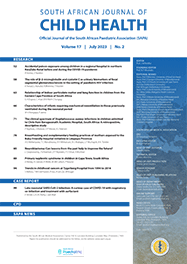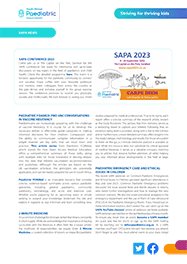Research

The barriers that women face when choosing food for their primary school children: A case study in the Western Cape Province, South Africa
Abstract
Background. Unhealthy food choices made by mothers can impact negatively on child health and may lead to unhealthy eating behaviours that persist into adulthood. Choosing food is a complex process influenced by many factors.
Objectives. To determine the factors that influence mothers’ food choices and to investigate barriers to purchasing healthy food.
Methods. A cross-sectional, descriptive study, with an analytical component, was conducted. Mothers (N=476) were recruited from three randomly selected primary schools, from a low, middle and high quintile. A self-administered questionnaire was used to collect data on demographics, knowledge, attitude and practices of mothers. Six focus groups (FG) (two per school) were conducted to investigate the factors that prevent mothers from making healthy dietary decisions.
Results. The mean nutrition knowledge score for the group was 68.6%. Nutrition knowledge was significantly lower (p<0.01) in mothers from the lower quintile school (64.0%). Primary factors influencing food purchases were cost (60%), nutritional value (37%) and time constraints (29%). Primary sources of nutrition information included magazines and health professionals at 62% and 44%, respectively. Time constraints resulted in mothers purchasing convenience foods more often (p=0.001). The main barriers identified were mixed media messages, the school environments and supermarket layouts.
Conclusion. Nutrition education campaigns should include practical advice, e.g. the preparation of economical, wholesome meals. Policymakers should monitor increasing prices of healthy foods. School and supermarket environments, as well as the food industry, can play a pivotal role in facilitating mothers to make healthy food choices
Authors' affiliations
Y Smit, Division of Human Nutrition, Faculty of Medicine and Health Sciences, Stellenbosch University, Cape Town, South Africa
S Kassier, Dietetics and Human Nutrition, University of KwaZulu-Natal, Pietermaritzburg, South Africa
D Nel, Centre for Statistical Analyses, Stellenbosch University, Stellenbosch, South Africa
N Koen, Division of Human Nutrition, Faculty of Medicine and Health Sciences, Stellenbosch University, Cape Town, South Africa
Full Text
Cite this article
Article History
Date published: 2017-10-05
Article Views
Full text views: 1465

.jpg)



Comments on this article
*Read our policy for posting comments here